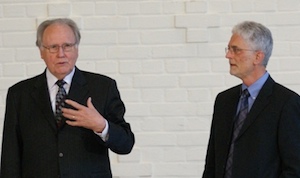Pastor Dr Jan Paulsen, former President of the General Conference (headquarter of the worldwide Seventh-day Adventist church) spoke in the Seventh-day Adventist church Stuttgart/Germany about the church’s challenges in the 21st century. He stressed that the decision about women’s ordination as pastors was one of the top priorities. A wide range of committees in the world church have tackled this question for the past 40 years. In 1990 the General Assembly of the General Conference (World Council) and the supreme decision-making body denied the right of women’s ordination. When the Adventists in North America asked for permission to ordain women as pastors in their area of responsibility, the majority of the world council meeting in Utrecht in 1995 rejected the request again. This very same question is again on the agenda of the General Conference General Assembly in 2015 which is scheduled from 2 to 11 July in San Antonio, Texas/USA. On fears that a decision to ordain women, could divide the church, Paulsen replied : "Perhaps so. But equally, not to ordain women has the same probability to divide our church." It is, therefore, important to find a solution which is acceptable to both parties. All arguments – whether for or against – have been presented and exchanged and the problem cannot be postponed again.
Church – an active part of life or irrelevant sect
According to Paulsen, there are, however, a number of additional challenges for the church. Despite cultural differences and theological challenges it was necessary for the global church to preserve the unity and identity. A global community of faith faced the difficult task of integrating their spiritual values into the practical aspects of daily life in many different cultures. It was necessary to resist the ‘easy solution’ to withdraw from people who had completely different values of life into ‘the own perfect world’. Paulsen cautioned: "Either the public accepts us as part of society and sees that we want to be an active part of life in the political community, or the public considers us as an irrelevant sect which dissociates itself from all others. Our world may no longer be interested in God, but it is a world full of people whom we, under no circumstances, can leave to fend for themselves." Adventists should therefore live out their values, prepare people for the future, such as by way of education, and act as peacemakers.
Inter-church relations
In dealing with other Christian churches and other world religions Paulsen also posed the question: "In our dealings with them are we having an open-minded attitude and apply a constructive dialogue? Do we explain to them who we are, what we believe and which duties we have, or do we seal ourselves off, withdraw and consider any communication with other faiths as dangerous?" Either Adventists introduce themselves "or others will do it for us – but then we will be most likely misrepresented or even ridiculed.” It was of course easier to only interact with like-minded people, however, the ‘Truth’ would not have to be afraid of scrutiny. It was the duty of Adventist church members, pastors, teachers and leaders to demonstrate how one's own convictions and the respect for other faiths could co-exist.
Jan Paulsen was born in Northern Norway. After finishing his studies he served as pastor, professor and dean at Adventist universities in Africa. He then taught at Newbold College in England, where he soon was appointed dean. He earned his doctorate in theology at the University of Tübingen in 1972. In 1980 he was elected Secretary and in 1983 President of the Seventh-day Adventist Church in Northern and Southeastern Europe. In 1999 he was elected President of the General Conference of the Seventh-day Adventists (world headquarter), an appointment which he held until the age of 75 years in 2010. In 2012 the King of Norway decorated Jan Paulsen ‘for his meritorious service to the welfare of mankind’. Paulsen is married to Kari and they have an adult daughter and two sons.


